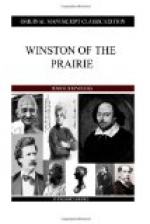“Is that bridge fit for crossing, farmer?” he asked.
“Yes,” said Winston quietly. “You must lead your horse.”
Maud Barrington had in the meanwhile stood very still, and now moved as by an effort. “It is time I rode on, and you can show the stranger across,” she said. “I have kept you at least five minutes longer than was necessary.”
Courthorne, Winston fancied, shifted one foot from the stirrup, but then sat still as the farmer held his hand for the girl to mount by, while when she rode away he looked at his companion with a trace of anger as well as irony in his eyes.
“Yes,” said Winston. “What you heard was correct. Miss Barrington’s horse fell lame coming from one of the farms, which accounts for her passing here so late. I had just led the beast across the incompleted bridge. Still, it is not on my account I tell you this. Where have you been and why have you broken one of my conditions?”
Courthorne laughed. “It seems to me you are adopting a somewhat curious tone. I went to my homestead to look for you.”
“You have not answered my other question, and in the meanwhile I am your tenant, and the place is mine.”
“We really needn’t quibble,” said Courthorne. “I came for the very simple reason that I wanted money.”
“You had one thousand dollars,” said Winston dryly.
Courthorne made a little gesture of resignation. “It is, however, certain that I haven’t got them now. They went as dollars usually do. The fact is, I have met one or two men recently who apparently know rather more games of chance than I do, and I passed on the fame, which was my most valuable asset, to you.”
“You passed me on the brand of a crime I never committed,” said Winston grimly. “That, however, is not the question now. Not one dollar, except at the time agreed upon, will you get from me. Why did you come here dressed as we usually are on the prairie?”
Courthorne glanced down at the deerskin jacket and smiled as he straightened himself into a caricature of Winston’s mounted attitude. It was done cleverly.
“When I ride in this fashion we are really not very unlike, you see, and I let one or two men I met get a good look at me,” he said. “I meant it as a hint that it would be wise of you to come to terms with me.”
“I have done so already. You made the bargain.”
“Well,” said Courthorne, smiling, “a contract may be modified at any time when both parties are willing.”
“One is not,” said Winston dryly. “You heard my terms, and nothing that you can urge will move me a hairsbreadth from them.”
Courthorne looked at him steadily, and some men would have found his glance disconcerting, for now and then all the wickedness that was in him showed in his half-closed eyes. Still, he saw that the farmer was unyielding.
“Then we will let it go; in the meanwhile,” he said, “take me across the bridge.”




